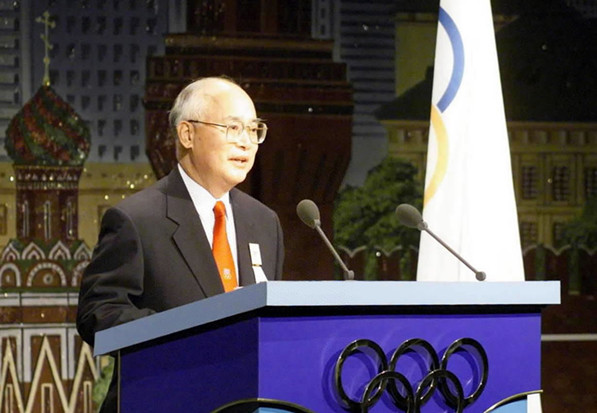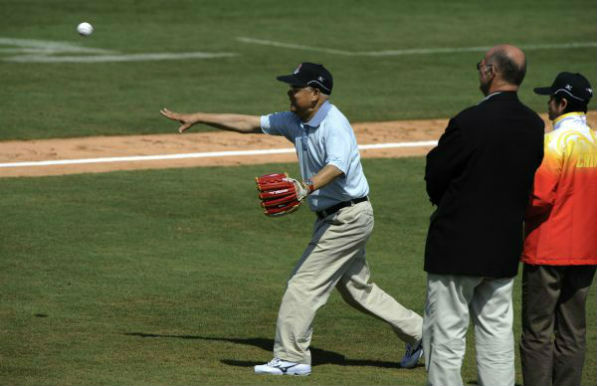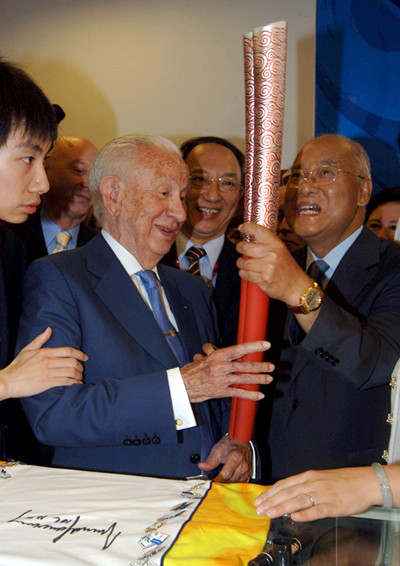
He Zhenliang delived a speech on Beijing's bid for the 2008 Olympic Games at the 112th session of the International Olympic Games in Moscow on July 13, 2001. Wang Changshan Xinhua/China Features
He Zhenliang, a former IOC member and vice president died for illness on Jan. 4 in Beijing at the age of 85.
The International Olympic Committee (IOC) expressed great sadness for the death .
"It is with great sadness that the IOC has learnt of the death of Zhenliang He, IOC Honorary Member in the People's Republic of China," said a release of the IOC official website olympic.org.
The IOC President Thomas Bach has asked for the Olympic flag to be flown half-mast for three days in tribute to He.
He, a native of Wuxi, in southeast China's Jiangsu province, saw his career shine on July 13, 2001, at the IOC 112th Session in Moscow, where he presided over Beijing's final presentation for its bid for the 2008 Olympics. The city eventually won the host role in the final vote, and since then he was nicknamed as "China's Mr. Olympics".
The exceptional success of the 2008 Olympics in Beijing marked China's ascent to a major world sports power, which was witnessed and assisted by He, who since the 1950s had been a bridge connecting China to the international sports mainstream.

He Zhenliang kicked off the baseball Preliminaries Games 9 between China and Chinese Taipei in Beijing, on Aug. 15, 2008. Guo Lei Xinhua/China Features
He started his career in 1955 as an international communication official, in what was then the National Sports Commission, with impressive foreign language skills. He then began working as a senior official in the 1960s for such domestic organizations as the Chinese Table TennisAssociation, the All-China Sports Federation and the COC.
After being elected to the executive board of the IOC in 1985, He, who was eventually voted IOC vice-president in 1989, had devoted himself to introducing China's sports progress to the world. He promoted the Olympic Movement in China and dispelled misunderstandings about China's unique sports system by communicating consistently with the IOC and other international sports organizations.
Major sports figures in China expressed their condolences after He's death, emphasizing that the sports diplomat should be long remembered for his contribution to raising China's image from obscurity to an active and competitive player in the international sporting community.
"China's current major-member status in the IOC is inseparable from He's hard work for decades. His strong enthusiasm and responsibility to China's sports development as well as improvement of its international image truly impressed me," Wei Jizhong, former secretary-general of the COC and He's longtime colleague, said on Jan. 4
Wei recalled that his most unforgettable moment regarding He was when He Zhenliang wept privately after Beijing failed in 1993 in its Olympic bid for the 2000 Summer Games.
"He said he felt he had let his country and people down, while in fact he'd done what he could to the utmost (to help Beijing as a bid committee member)," Wei said. "His promotion for Beijing during the first bid and his valuable suggestions the second time played a big part in the success of 2008."
Yang Yang, the retired short-track speed skater who is a two-time Olympic gold medalist and a current IOC member, hailed He as a guiding light for her transition from an elite athlete to an international sports official.
"His fruitful work in the IOC earned a positive impression from the world about Chinese sports, which inspired me and guided me to continue my career as a sports official," said Yang.

He gave former IOC president Juan Antonio Samaranch a brief introduction on Xiangyun, Beijing Olympic torch in 2007. Luo Xiaoguang Xinhua/China Features
"A career politician, Mr. He was instrumental in bringing China back into Olympic Movement ... He was firm believer in sport's ability to educate, and long championed the teaching of the Olympic values as well as sport in school curricula," the IOC said.
IOC President Bach was quoted as saying in the release that "Mr. He was a man of culture and art. He was a true advocate of the social values of sport and of our Movement and I would like to pay tribute to the passion and energy he deployed over the years to fulfill his mission as an IOC Member in China."
"He also helped our Movement better understand his country, its people and outstanding culture. The Olympic Movement has lost one of its most fervent ambassadors," said Bach.
"For me personally he showed me true friendship and gave me invaluable advice from my very early days as an IOC member. I will always remember this with great gratitude," the President added.
The Beijing 2022 Olympic Winter Games Bid Committee also issued an official statement on Jan.4 to mourn He's death, praising his efforts in pushing the Olympic Movement in China and vowing to do its best to win the 2022 host role as a tribute to He.

